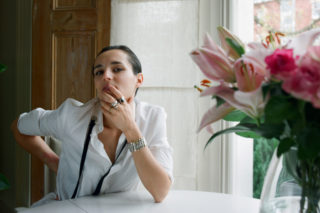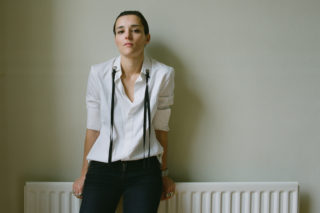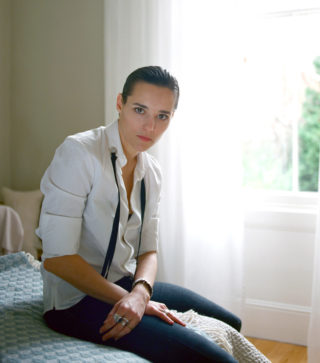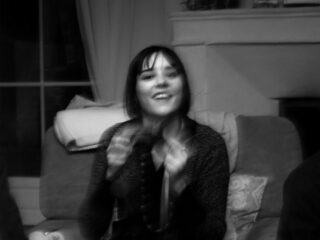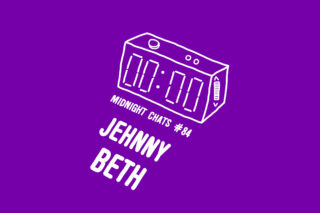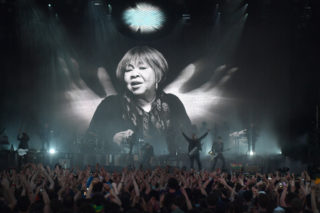There’s a light frost on the steps of Jehnny Beth’s north London home, but inside, the living room fire is roaring. A microphone, laptop and sampler are scattered on the soft carpet. A couple of chairs and an inviting sofa look almost too nice to sit in. There’s a colourful bunch of flowers on the table. It’s a stylish, classic, compact room full of elegant flare. Jehnny clasps a mug of steaming green tea and quietly takes a seat by the front bay window. It’s the morning after Savages’ penultimate show of 2016, and the day before the band perform their “last show in a while” by playing their largest headline show at Brixton Academy.
It’s 10 years since Camille Berthomier left her native France and moved to London with her partner Johnny Hostile (Nicolas Congé). Together they performed with their stage names as John & Jehn and released two albums (2008’s ‘John & Jehn’ and 2010’s ‘Time for the Devil’). In autumn 2011 she formed Savages with a group of friends from different bands – Fay Milton, Gemma Thompson and Ayşe Hussan. Their first show was supporting British Sea Power in Brighton.
When Savages materialised they felt like the real deal. Real in that they had conviction, deal in that, from the outset, they seemed like a band it was clear would be around for a while. Live they were arresting, and in interviews they responded to lines of questioning about their gender, the current health of rock and roll and lifestyle choices (three of the four now choose not to drink alcohol) with the forthrightness they often deserved. Debut LP ‘Silence Yourself’, delivered in May 2013 and subsequently nominated for the Mercury Prize, was an album served with a manifesto. “Savages’ songs aim to remind us that human beings haven’t evolved so much,” it said. “That music can still be straight to the point, efficient and exciting.” Their arrival felt like an exhilarating blast of cold air.
It was just a month’s break before they began working on the follow-up. ‘Adore Life’ came together in front of people’s eyes – literally – during a run of work-in-progress live shows in New York where they used crowd’s reaction to evolve the material. A more positive, harder, heavier album about, of all things, the theme of love emerged.
The band began this year by unveiling those songs at a breakfast-time show at The 100 Club in central London, before playing a gig almost every day through to September. Combative performances at Primavera Sound, Barcelona, in June, where they stole Radiohead’s thunder, and End of the Road in September, performing aptly underneath a bulging apocalyptic-looking black rain-cloud were personal highlights. Their shows, formerly talked about as austere, didactic and almost Joy Division-like in their standoffishness were now tension-filled, brutal communal gatherings, inclusive, escapist and fun. The vision of Jehnny Beth walking across the hands of the audience night after night has become an indelible image of 2016.
Away from those visceral punk shows, Savages’ members have always been active outside of their band. Hassan performs with dual-bass duo Kite Base, Milton has created an informative online video series called Very Important Things, which breaks down some impenetrable topics like Transatlantic Trade Investment Partnerships. They’re all involved in different art forms, all frequent collaborators with other artists.
Since April Jehnny Beth has been making a weekly radio show, the evidence of which is found in the lounge today. It’s been put together in hotel lobbies, dressing rooms, any space she can use. The series, Start Making Sense for Beats 1, viewed collectively, makes up a who’s who of alternative icons and many emerging ones. For it, she’s broadcast conversations with David Byrne, Ian Mackaye, Shirley Manson, Mike Patton, Romy from The xx, Johnny Marr, Karl Hyde, Massive Attack, Henry Rollins and Nancy Whang. People who don’t regularly do interviews.
“It feels strange being on this side [of the mic],” she says settling down, the winter sun streaming into the room. “I haven’t been interviewed for a while.”




